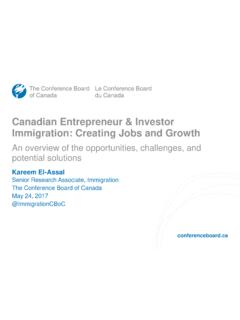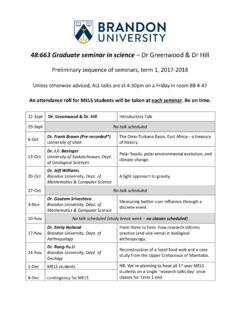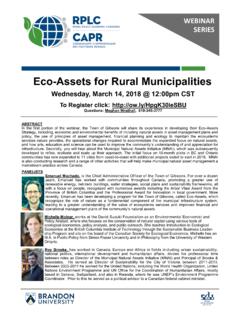Transcription of COMPARATIVE RESEARCH - Brandon University
1 RURAL DEVELOPMENT INSTITUTECOMPARATIVE RESEARCHCOMPARATIVE RESEARCHR ural Development Institute, Brandon UniversityBrandon University established the Rural Development Institute in 1989 as an academic RESEARCH centre and a leading source of information on issues affecting rural communities in Western Canada and functions as a not-for-profit RESEARCH and development organization designed to promote, facilitate, coordinate, initiate and conduct multi-disciplinary academic and applied RESEARCH on rural issues. The Institute provides an interface between academic RESEARCH efforts and the community by acting as a conduit of rural RESEARCH information and by facilitating community involvement in rural development.
2 RDI projects are characterized by cooperative and collaborative efforts of multi-stakeholders. The Institute has diverse RESEARCH affiliations, and multiple community and government linkages related to its rural development mandate. RDI disseminates information to a variety of constituents and stakeholders and makes RESEARCH information and results widely available to the public either in printed form or by means of public lectures, seminars, workshops and more information, please visit Copyright June 2017 Prepared by:Michael Adiyia, MRD William Ashton, PhD, DirectorRural Development Institute Brandon UniversityIIIT able of ContentsIntroduction 1 Types of COMPARATIVE RESEARCH 2 Institutions Doing COMPARATIVE RESEARCH and Areas of Focus 3 COMPARATIVE Papers 4 COMPARATIVE Rural Policy Papers 6 COMPARATIVE Studies Journals 7 References 8 IVCOMPARATIVE RESEARCH1 According to Pickvance (2005), COMPARATIVE analysis is conducted mainly to explain and gain a better understanding of the causal processes involved in the creation of an event, feature or relationship usually by bringing together variations in the explanatory variable or variables.
3 COMPARATIVE RESEARCH can be traced to a long history that has gained much attention in current RESEARCH due to globalization, technological advances, etc. on cross-national platforms (Azarian, 2011). Conventionally, COMPARATIVE analysis emphasized on the explanation of differences, and the explanation of similarities ( ). This helps to establish relationships between two or more phenomena and provide valid reasons. Comparisons are now carried out on various levels being regional, national or wider geographical boundaries based on specific subject or area of interest. This report seeks to provide an overview of the methods of COMPARATIVE RESEARCH , institutions doing COMPARATIVE RESEARCH , COMPARATIVE RESEARCH papers (including those with rural focus) and journals with COMPARATIVE RESEARCH focus.
4 This will serve as a fundamental resource to enlighten students and other users with interest in undertaking COMPARATIVE studies. The list provided in the report is not a comprehensive one and additional views or comments are greatly welcome in building this , a special thanks to graduate student Michael Adiyia, Masters student in the Rural Development program at Brandon University for his efforts to conceptualize this report and complete the necessary RESEARCHT ypes of COMPARATIVE ResearchThere are several methods of doing COMPARATIVE analysis and Tilly (1984) distinguishes four types of COMPARATIVE analysis namely: individualizing, universalizing, variation-finding and encompassing ( ). Adding to the types of COMPARATIVE analysis, May (1993, as cited in Azarian 2011, p.)
5 117) offers a four-folded typology, including the import-mirror view, the difference view, the theory-development view and, finally, the prediction view. These types are similar to that suggested by Tilly (1984) which are elaborated Individualizing comparison contrasts a small number of cases in order to grasp the peculiarities of each case (1984, p. 82). This basically involves describing fully the characteristics or features each of the cases being studied. This helps to broaden our knowledge and gives insight to see cases in-depth. This method cannot be said to be truly COMPARATIVE but makes use of comparison in a small aspect of the RESEARCH (Fredrickson, 1997).b. Universalizing comparison aims to establish that every instance of a phenomenon follows essentially the same rule (1984, p.
6 82). This involves the use of comparison to develop fundamental theories with significant generality and relevance; goes to further to provide theories which explain the cases being studied. development of theories of industrialism, social revolutions Variation-finding comparison seeks to establish a principle of variation in the character or intensity of a phenomenon by examining systematic differences between instances (1984, p. 82). That is, comparing numerous forms of a single phenomenon to discover logical differences among instances and establish a standard of variation in the character or intensity of that phenomenon. Green (1997) study of the modern Jewish Diaspora and Moore (1966) study on Social Origins of dictatorship and Encompassing comparison places different instances at various locations within the same system, on the way to explaining their characteristics as a function of their varying relationships to the system as a whole (1984, p.
7 83). explaining the difference between two children s behavior by their orders of birth, attributing the characteristics of rural communities to their varying connections with a nearby city or urban International Development & Development Education Centre (CIDEC) mandate is to promote excellence, collaboration, and innovation in COMPARATIVE and international educational RESEARCH at OISE. The CIDEC community includes over 50 faculty members, adjunct faculty, and visiting scholars. More than 120 graduate student researchers with an interest in international issues and COMPARATIVE methodologies in the field of education are affiliated with the Centre. RESEARCH projects include a COMPARATIVE study of the professional working knowledge of teachers in the Nigerian States of Kwara, Lagos, Kano, Kaduna and Jigawa (ESSPIN, DFID) and the professional working knowledge of teachers in India (Core Projects and Technologies).
8 The Institute for COMPARATIVE Studies in Literature, Art and Culture (ICSLAC) (Carleton University ) is a haven for intellectually rebellious researchers; a home for those who seek independence as well as a sense of belonging. Starting from a place of deep disciplinary knowledge and theoretical rigour, the institute set the stage for productive academic discomfort. Inside and outside the classroom, create an intellectual community that leads to greater engagement and understanding. Our RESEARCH areas include: cultural theory, memory studies, Indigenous studies, digital culture, transnational studies, gender studies, and critical Ohio State University - The Department of COMPARATIVE Studies is committed to interdisciplinary and cross-cultural inquiry and exchange.
9 Their RESEARCH and teaching focus on the rigorous COMPARATIVE study of human experiences and ground our engagement with issues of social justice. COMPARATIVE Studies students are encouraged to develop their critical and analytical skills and to become effective global citizens, guided by an ethos of mutual respect and persistent questioning, and recognition of the value and pleasures of critical intellectual University International COMPARATIVE Studies ICS majors share a common foundation of class experiences and knowledge in critical transnationalism derived from their participation in the interdisciplinary core courses; COMPARATIVE Approaches to Global Issues and Capstone Global Studies Seminar. ICS provides knowledge in the culture(s), history, politics, and language relevant to one geographic area of the world or region Studies in Society and History (CSSH) is an international forum for new RESEARCH and interpretation concerning problems of recurrent patterning and change in human societies through time and in the contemporary world.
10 CSSH sets up a working alliance among specialists in all branches of the social sciences and humanities as a way of bringing together multidisciplinary RESEARCH , cultural studies, and theory, especially in anthropology, history, political science, and sociologyThe COMPARATIVE Studies in Literature and Culture department offers students the opportunity to design, in consultation with department faculty, a fully interdisciplinary major that engages at least one specific literature and language, and one specialized external discipline of their own choosing. To develop the student s capacity for pluralized understanding, each major take at least two courses within the department in literatures and cultures outside their area of specialization, as well as an introductory methods course on contemporary trends in literary and cultural for COMPARATIVE Construction RESEARCH CCCR currently occupies a niche position by specializing in RESEARCH on performance and productivity issues of the global construction industry, and other matters relating to COMPARATIVE construction, such as project management effectiveness, building quality, building refurbishment and retrofit, bidding theory, green building design.




